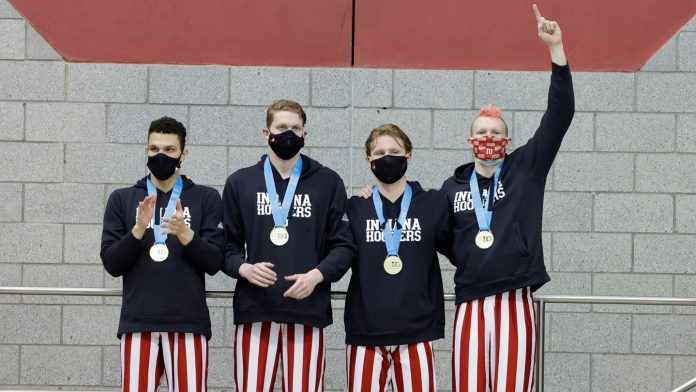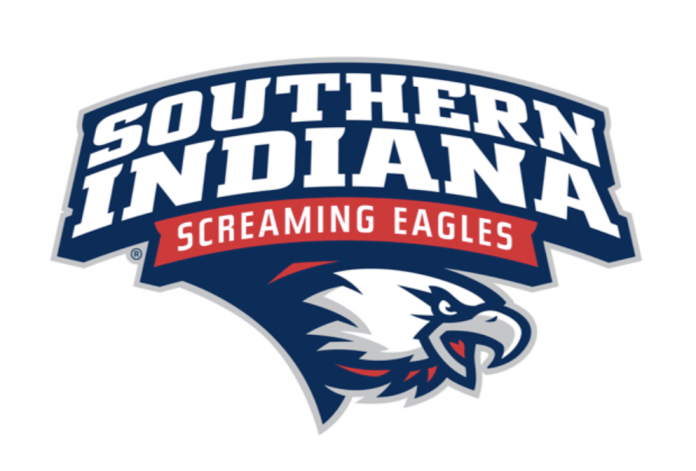MATTOON, Ill. – The Vincennes University Lady Trailblazers earned a spot in the Region 24 Championship game for the first time since 2019 Tuesday night after the Blazers defeated No. 3 seed Southwestern Illinois College 66-63.
VU got off to a red-hot start Tuesday night, riding the wave of three first quarter three-point makes by sophomore Cherrelle Newsom (Indianapolis, Ind.) the Lady Blazers quickly grabbed an early 16-8 lead.
Vincennes would end the first period of play holding a 19-14 lead over the Lady Blue Storm, behind 11 points by Newsom in the first 10 minutes of play.
The Blazers would continue to grow their lead early in the second quarter, reaching their largest lead of 10 points with a 7-2 scoring run to start the second quarter.
Southwestern Illinois would not go down quietly however as the Lady Blue Storm ended the first half on a 9-2 run to cut the VU lead to 32-29 at the halftime break.
VU started the third quarter of action looking to again put some distance between them and the Blue Storm on the scoreboard and grew their lead back to nine before SWIC answered the call again with a big 14-3 run to take their first lead since early in the first quarter.
The two teams would trade baskets late in the third period with VU tying the game at 48-48 heading into the final 10 minutes of action.
With 10 minutes left to play in the season for one of these two teams, the pressure inside Laker Fieldhouse continued to grow with every possession.
The two teams traded scoring runs with VU ending up ahead 55-53.
The score was tied five separate times throughout the late stages of the game, with VU sophomore Kennadi Harris hitting a dagger of a baseline jumper to give the Lady Blazers a 65-63 lead with 20.6 seconds remaining.
Freshman Maycee Lange (Vincennes, Ind.) came down court to come away with a steal and get sent to the foul line on the following SWIC possession, making one of her two free throw attempts to give VU a three-point lead.
Looking to send it to overtime the Blue Storm raced down the floor to get a shot at the buzzer but the shot attempt was sent back by Harris as VU came away with the big 66-63 victory over Southwestern Illinois and earned their spot in Thursday night’s Region 24 Championship game.
VU was led offensively by freshman Elikya Baseyila (Paris, France) who came on strong in the second quarter and scored 11 of her team-high 17 points in the first half. Baseyila also led the Lady Blazers with seven rebounds on the night, while also dishing out three assists.
Cherrelle Newsom would spring loose for another three pointer, giving her four on the game on her way to 16 points and a team-high five assists.
Sophomore Daylynn Thornton (Lafayette, Ind.) would also reach double-figures in the scoring column, finishing her night with 11 points and matching Newsom with a team-high five assists.
Maycee Lange connected on a pair of three-pointers on her way to nine points and seven rebounds on the night. Lange would also lead VU with a pair of steals.
Kennadi Harris came off the bench to pick up seven big points for the Lady Blazers, while also grabbing two rebounds and ending with a team-high two blocks.
The Lady Trailblazers advance to the Region 24 Championship game Thursday, March 9 when VU will face-off against No. 12-ranked and No. 1 seeded Wabash Valley College at Lake Land College in Mattoon. Tip-off time Thursday is set for 7 p.m. eastern.
The winner of Thursday’s Championship game will earn an automatic bid to the NJCAA Division I Women’s Basketball National Tournament which will be held March 22 through the 27th at the Rip Griffin Center in Lubbock, Tex.
VINCENNES BOX SCORE
VINCENNES (66): Cherrelle Newsom 6-11 0-0 16, Daylynn Thornton 4-12 2-2 11, Brie Miller 1-1 0-0 2, Elikya Baseyila 6-12 5-8 17, Maycee Lange 3-8 1-2 9, Kennadi Harris 3-6 1-4 7, Chanice Willis 0-3 0-0 0, Katrina Litte 0-5 2-2 2, Ra’Mya Milton 1-1 0-0 2, Team 24-59 11-18 66.
Southwestern Illinois – 14   15  19  15 – 63
VU (21-10, 14-4) – 19   13  16  18 – 66
Three-point goals: VU 7 (Newsom 4, Lange 2, Thornton). Rebounds: VU 33 (Baseyila 7, Lange 7). Assists: VU 17 (Newsom 5, Thornton 5). Steals: VU 4 (Lange 2). Blocked Shots: VU 3 (Harris 2). Turnovers: VU 22. Personal Fouls: VU 18. Fouled out: None.
-30-
The Vincennes University Lady Trailblazers improve to 21-10 on the season, with a 14-4 record against Region 24 opponents.












 An evening of entertainment and meaningful messages in song with Bill and Gloria & Their Homecoming Friends will leave you encouraged, grateful, and most certainly smiling!
An evening of entertainment and meaningful messages in song with Bill and Gloria & Their Homecoming Friends will leave you encouraged, grateful, and most certainly smiling!





